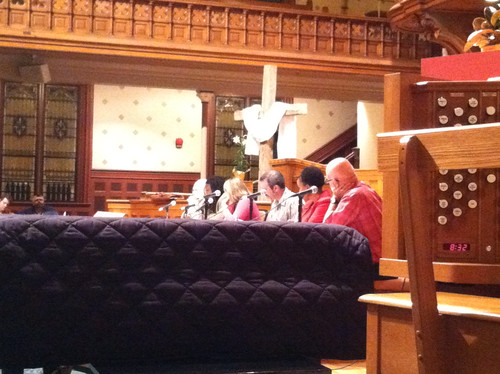I am not always sure what to say when a student shares about their desire to join the military, to take up arms and live in the third dimension of the Call-of-Duty world. I hesitate to share my grief or unveil the gospel's call to make peace and turn swords into plowshares. I fear that I may irresponsibly shatter their dreams or drive a wedge into a relationship not only between me and that student, but also between that student and his/her family. Yet I cannot help but lament when I learn that students who have grown up in the church now possess dreams to serve as Army Rangers on special ops. I wonder if they even are fully aware of what this all means when they enlist.
So when this particular student traveled with me to Broad Street one Sunday night and shared these very dreams, I remained silent. I listened. I prayed. I trusted that the God who gifted this student with so much creativity and imagination could work within his heart and mind.
And God did.
We worshipped that night with our friends on the Avenue of the Arts, friends this student was meeting for the first time. When the Eucharist had been shared and the peace had been passed, the sanctuary was transformed into a dining room and this student sat with strangers. One such stranger was a homeless vet. He shared about how he also was once zealous to serve in the military and so enlisted and traveled the world as a soldier. Yet, the third dimension of war- violence, injustice, oppression, pain, and real flesh and blood people with stories and families- took him by surprise and overwhelmed his conscience. This homeless vet went on to share how he no longer practices war and instead advocates for alternative means to discover peace.
The student shared this story with all of us in the car as we drove back to the church parking lot that Sunday night. I fought back tears. Then he said those words I will never forget, "I think I can be more creative than violence." I responded, "Yes. I think you can. I hope you will."The challenge for us as youth pastors is to cultivate environments where students can experiment and dialogue about this creativity. We must become intentional and ponder how to create space for students to think beyond war and quest for peace and reconciliation near and far. As the moderator of tonight's panel, Carl Stauffer, remarked, "we need to rechannel the energy generated by narratives of violence into energy for peacemaking...our work in peace building will only be successful when we can offer a compelling alternative to what violence offers."
This is hard work. This is subversive youth ministry. The ability for the church in general and youth minsitries in particular to recover the imaginations of children and youth from a culture so inundated with violence as entertainment and means to (pseudo)redemption requires much contemplation and pastoral care. However, sometimes we will find that all we can do is be silent and allow God to cross the path of one high school student with the path of one homeless veteran who will rechannel the energy and dreams better than any youth pastor or carefully crafted theological conversation.
A few helpful remarks from tonight's panel:
"Justice is reconciliation and equity not retribution." (John Westerhoff)
"We must replace forgive and forget with remember and repent" (Carl Stauffer)
"The Eucharist table is a gathering of the oppressed and the oppressor. It is where the oppressors can confess their oppression and the oppressed can be validated in their sufferings." (Brain McLaren)
"Force is not the same as violence. Not all force is violence and not all violence is force. We need to reclaim the distinction." (Melvin Bray)

